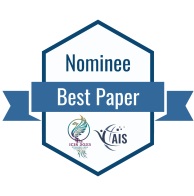Blockchain, DLT, and Fintech
Loading...
Paper Number
1001
Paper Type
Completed
Description
Blockchain technology has enabled the emergence of decentralized autonomous organizations (DAOs) with consensus-based governance. Staking governs DAOs instead of centralized authorities. As a new organizing form, DAOs require careful theoretical consideration. We conceptualize the vehicle of consensus-based governance as digital consensus. Using an agent-based simulation model, this paper aims to extend meta-organization theory to incorporate an organizational learning perspective. We benchmark the DAOs using two well-established organizing forms, namely autonomous and hierarchical organizations. We find that hierarchies outperform DAOs in static environments, whereas DAOs outperform hierarchies in turbulent environments, with autonomies only excelling with intensive experimentation. Our analyses allow us to characterize DAOs as evolving through a staggered process of polarization and homogenization, as opposed to autonomies' continuous polarization and hierarchies' continuous homogenization. Such a staggered process can be affected by several factors (e.g., voting thresholds, token asymmetry, and contributor incentives).
Recommended Citation
Li, Junyi; Hahn, Jungpil; and Tayi, Giri, "Meta-Organizational Learning Through Digital Consensus" (2023). ICIS 2023 Proceedings. 16.
https://aisel.aisnet.org/icis2023/blockchain/blockchain/16
Meta-Organizational Learning Through Digital Consensus
Blockchain technology has enabled the emergence of decentralized autonomous organizations (DAOs) with consensus-based governance. Staking governs DAOs instead of centralized authorities. As a new organizing form, DAOs require careful theoretical consideration. We conceptualize the vehicle of consensus-based governance as digital consensus. Using an agent-based simulation model, this paper aims to extend meta-organization theory to incorporate an organizational learning perspective. We benchmark the DAOs using two well-established organizing forms, namely autonomous and hierarchical organizations. We find that hierarchies outperform DAOs in static environments, whereas DAOs outperform hierarchies in turbulent environments, with autonomies only excelling with intensive experimentation. Our analyses allow us to characterize DAOs as evolving through a staggered process of polarization and homogenization, as opposed to autonomies' continuous polarization and hierarchies' continuous homogenization. Such a staggered process can be affected by several factors (e.g., voting thresholds, token asymmetry, and contributor incentives).
When commenting on articles, please be friendly, welcoming, respectful and abide by the AIS eLibrary Discussion Thread Code of Conduct posted here.




Comments
07-Blockchain